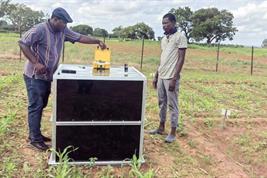10.07.2025

The Ecophysiology of Water and Matter Cycling group (ECO) at the Leibniz Centre for Agricultural Landscape Research (ZALF) has launched an open-source handbook for low-cost, DIY environmental sensor development.
This innovative handbook offers detailed, step-by-step instructions for building and calibrating sensor systems using widely available hardware—bridging the gap between scientific research and practical field use. Systems are linked to a selfmade App ("MonksHillLab Logger App") to allow for a user-friendly use.
Designed to support ecophysiological studies and sustainable land management, especially in under-resourced regions and the Global South, the project emphasizes accessibility, reproducibility, and real-world application. The initiative aims to democratize environmental science by equipping students, researchers, and practitioners with affordable tools for data collection and monitoring.
The handbook is a living document, inviting users to adapt existing designs, contribute new solutions, and participate in shaping future content. Contributions can be submitted directly via email to mathias.hoffmann@zalf.de.
With this collaborative approach, ZALF ECO fosters a growing, community-driven resource dedicated to enabling broader access to environmental research and sustainable agricultural innovation.
Further information:
https://doi.org/10.5281/zenodo.15562591
